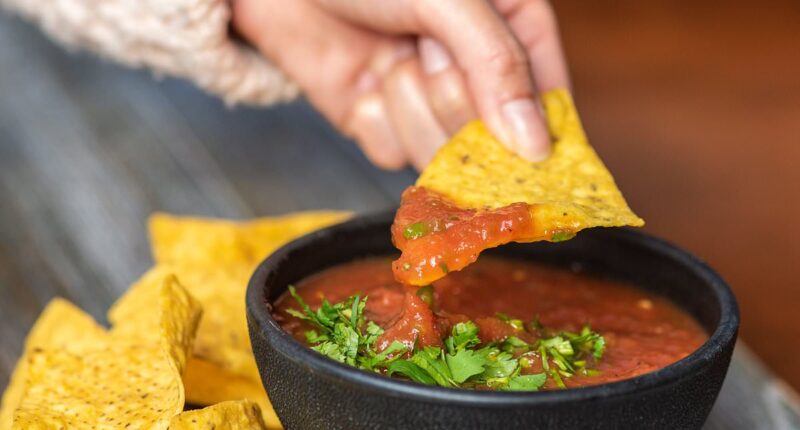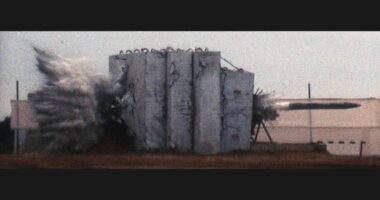A popular brand of salsa sold at Costco and other US grocery stores has been recalled due to possible wood contamination.
San Juan Salsa Co. (SJS) is pulling eight different products produced between December 19, 2024 and March 17, 2025.
These salsas may contain small wood particles, which depending on their size and shape may irritate or cut the mouth, throat and gut.
Certain types of wood may also contain natural toxins, and ingesting a large amount of these particles may lead to adverse health effects.
The company did not specify the shape and size of these particles, or what type of wood they are.
The culprit is through to be cilantro grown by SubHerb Farms in Turlock, California, that were found to be contaminated with wood.
SJS conducted a detailed examination of its manufacturing records and discovered that eight of its products with specific ‘Best Before’ dates may be contaminated.
Affected products have Best Before dates between January 21 and May 23, 2025.
The affected products include Mild Salsa, Medium Salsa, Hot Salsa, Traditional Salsa, Pineapple Mango Salsa, Verde Salsa, Men’s Room Roasted Red Salsa, and Costco 32-ounce containers of Medium Salsa.

Several types of salsas made by San Juan Salsa Co. have been recalled due to possible wood contamination
Consumers who have purchased any of these items are advised to inspect the Best Before dates and discard or return any products that fall within the specified date ranges mentioned in the recall.
These salsas are sold in grocery stores such as Costco and Kroger.
SJS stated that it has not received any notices or complaints from customers about products that may have been contaminated by this cilantro crop.
‘SJS also believes its internal manufacturing process eliminates the potential for wood particles to be contained as the result of cilantro being utilized in its products,’ the statement reads.
The size of these ‘small wood particles’ is unclear, but exposure to wood dust has been linked to health issues due to natural chemicals or substances in the wood, such as bacteria, molds and fungi.
Wood dust is a known carcinogen, but it primarily causes the disease through inhalation and results in cancer of the nasal cavity, paranasal sinuses and the upper part of the throat.
It is also associated with toxic effects; irritation of the eyes, nose and throat; dermatitis; and respiratory system issues which include decreased lung capacity and allergic reactions.
But there is no evidence to suggest that eating wood dust is linked to cancer or any of these other health impacts.

The salsas were made with cilantro grown by SubHerb Farms in Turlock, California. The farm recently informed SJS that it has recalled part of its crop because it may contain wood

Consumers who purchased any of the salsa products should check their Best Before dates, and return or throw away any that fall within the date ranges subject to this recall (STOCK)
SupHerb Farms voluntarily recalled 96,500 pounds of frozen cilantro due to ‘potential foreign object contamination’ on April 3, according to the Food and Drug Administration.
The herbs were distributed in California, Massachusetts, Michigan, New York, Ohio, Oregon, Texas, Washington, Canada and Mexico.
The cilantro used in SJS’s recalled products also caused the US Department of Agriculture’s Food Safety and Inspection Service (FSIS) to issue a public health alert for 13 frozen soup and bowl products earlier this month.
Those products were made and sold by multiple brands, including Campbell’s, Molly’s Kitchen, Healthy Request, Sysco, Vital Pursuit and Crafted Market by Meijer.
Eleven of the 13 products were soups, one is a chili and one is a taco bowl. All but one are frozen dishes.
The products range from those in 9.5oz to 32lb containers and have sell by and use by dates between April 2026 to December 2026.
They were shipped to retail and institutional locations in Illinois, Indiana, Michigan, and Ohio. But FSIS said it anticipated that other products may be added to the alert, which could result in nationwide impacts.
The complete list and product images are available from the FSIS.
The agency urged customers and any entities that may have the products to not consume or serve them.
They can either be thrown out or returned to the place of purchase.
A public health alert is different from a recall, which involves a company pulling its products from shelves over safety concerns.
The FSIS issues an alert to ‘inform the public about potential health risks in cases where a recall cannot be recommended,’ the USDA states.

















